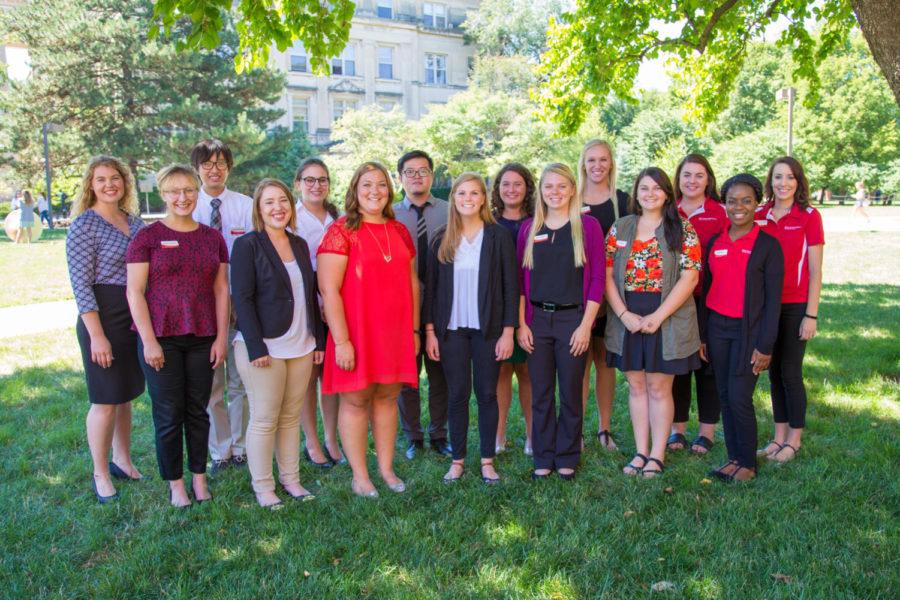Extension internship program creates Rising Stars
August 17, 2017
Most students don’t have the opportunity to be involved with all three parts of the land-grant mission. A select group, chosen each year to partner with Iowa State Extension Services, is the exception.
These students, termed the “rising star” interns, spend the summer bringing their skills and learning from the university to the state of Iowa.
“Rising Stars is an appropriate name for this internship, we’re like little celebrities,” intern Breanna Burnett-Larkins, senior in design said. “The rudest person I’ve met here is the teenager who gave me Starbucks in Burlington. Everyone else here has gone out of their way to be so friendly and nice.”
Now in it’s fourth year, the Rising Stars intern program expanded this summer to include students in the College of Agriculture, the College of Human Sciences and College of Design.
“You will learn a lot, and it’s not just major specific at all,” Thomata Doe, senior in nutritional science said. “You’re working with different people from different backgrounds and it’s a real eye-opener.”
Cheryl Heronemus, director for Region 1, said extension services was “bringing the university out to the people.” That fits right into the land-grant mission to provide services and education to all the people in the state, even those that do not go to school there.
“They all benefit from the research and education on campus,” Heronemus said.
The interns not only learn that themselves but share it with the communities.
“I thought 4-H is all Extension was. I didn’t realize how much research they do,” intern Kaitlin Brake, senior in graphic design and advertising, said. “Farmers can bring in a weed and be like “what is this?”
“Or a bug,” Burnett-Larkins added.
Region 20’s interns Burnett-Larkins and Doe found the internship through the Rising Stars booth at their career fairs. Brake heard about it from a friend who had participated.
The three were based in Mount Pleasant and served four counties: Des Moines, Lee, Louisa and Henry.
“I think when we came into it, we really didn’t know what we’d be doing. I assumed I’d be doing graphic design work, but Kaity [Brake] is a senior in graphic design,” Burnett-Larkins said. “It wasn’t like anything I thought, but it’s much better… I didn’t know anything about gardening, and now I know probably way too much.”
This was the first year the program included five regions in Iowa, each serving multiple counties.
What makes the internship unique is the latitude students have to help their communities and clients, Heronemus said.
“Each area or community has different needs, and you have to go into the situation and assess what the community needs,” Doe said.
Each intern had a personal project and the regions focused on different things, from local foods in Region 20, to youth education in Region 1, to economic development in Region 3.
“We worked with smaller communities that don’t have a lot of resources to it,” intern Josephina Matteson, senior in community and regional planning said. “I got to work with professionals in the field, I wrote two plans that are very tangible.”
Heronemus said Region 1 used a three step program, Know!Grow!Whoa!, to teach children about nutrition and agriculture.
“For the first few years, we just had design and human sciences, and everybody would say to us ‘how can you be doing something with local foods and not have the [College of Agriculture] involved?” Heronemus said. “They didn’t step into the scene until this year. That additional partner brings in another set of expertise from students.”
The interns in Region 20 had a special mission as the result of a USDA Local Food Production and Promotion grant.
“We do farmers markets, tastings of local foods, because that’s what our whole internship is about, promoting local foods and local growers,” Brake said. “We’re teaching people about fruits and vegetables, but we’re also learning at the same time.”
Burnett-Larkins said what she was doing was “extremely informative and educational.”
The interns created dinosaur stickers that promoted eating locally and shopping list pads. Burnett-Larkins focused on helping local producers stage at farmers markets.
“We do a lot of farm visits, where we’ll do a little promotional video for them and then a lot of times they’ll give us their stuff that they grow or harvest and we’ll do a video recipe or blog post about that too,” Burnett-Larkins said.
They also worked at a community garden and Doe worked with connecting school programs to local producers.
“Our schedule changes all the time. It’s not like a normal internship where your boss hands you a list of stuff to do for the day.” Burnett-Larkins said. “Just coming with your own ideas, what you want to do and your own schedule.”
Doe also thought the internship taught typical “first-job” skills, like making phone calls.
Brake said they also had to learn the dynamic of working and living together, since the three interns shared an apartment on the Wesleyan campus.
Doe, Brake and Burnett-Larkins said their community was welcoming to them, and would recognize them as the Rising Stars.
“I thought it was really cheesy, but when you walk around with your ISU polo on, people are like “oh!” Brake said. “They know who you are.”
















